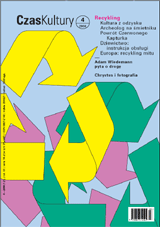W stron´ kultury odzysku – design a estetyka śmietnika
Towards the Recycling Culture. Designers and the Aesthetics of the Rubbish Dump
Author(s): Katarzyna Przerwa-ZydorowiczSubject(s): Cultural Essay, Political Essay, Societal Essay
Published by: Stowarzyszenie Czasu Kultury
Keywords: Modern design vs. rubbish dumps; Hippy-like playing with trash and modern designer recycling; ecological and socially-beneficial aims of designers;
Summary/Abstract: Today’s mad drive to design new objects is ruthless resulting in the elimination of older products as things are no longer needed and quickly become obsolete in the light of our staggering rate of consumption. The rapid expansion of rubbish dumps, which is a big cause for concern for the environmentally-conscious citizen, is now becoming a challenge for designers. Recycling and giving new life to discarded objects is now synonymous to creating a new reality. The old Form Follows Function principle is gradually being replaced with a fresh approach: Form Produces Visions. Consequently, the former “use and discard” relationship is being substituted with the relationship which is established between the reactivated object and the user. As far back as the 1960’s the idea of recycling already featured in the hippy lifestyles. Examples are Luster Clarence Schmidt’s intriguing home of built in the Woodstock Hills in 1967 and the hippy commune in Drop City, Colorado in 1965, which expressed the creativeness with which recycled materials can be used. Modern ecological and economic issues provide new goals for designers. The author emphasises that implementing designs based on recycling leads to the purification of the environment and an improvement in the quality of people’s living areas. An excellent example of this is the city of Curitiba in Brazil which was improved in the 1990’s using the recycling approach, particularly in the poorer areas. Despite the fact that commercial factors and consumerism are still the dominating themes of our times, there is an increasing urge among designers to follow environment-friendly and community-orientated trends which are based on recycling and which improve our living conditions.
Journal: Czas Kultury
- Issue Year: 2004
- Issue No: 04
- Page Range: 22-29
- Page Count: 7
- Language: Polish
- Content File-PDF

